 Last week, I touched on what it was like for us, as survivors of narcissistic abuse, to try and reclaim our lost sense of identity once we were freed from our narcissist’s grip. From the outside looking in, one might postulate that no longer being subjected to the daily onslaught of gaslighting, triangulation, manipulation, and abuse would be liberating. Well, one would think so. Unfortunately, it doesn’t work like that. I recently had the occasion to meet someone who reminded me just how powerful the trauma bond can be with a narcissist. Even though it’s been well over a year since my escape from the relationship with Julia, my narcissist, even as a survivor, the memory of the intensity of those suffocatingly and endlessly exhausting emotions invariably wanes with time – it’s just part of the healing process. One does, indeed, remember that the torturous tribulation of healing was a painful and arduous journey, but the nuances of the unabiding depth of that pain fades fairly quickly when one doesn’t find themselves immersed in it on a daily basis.
Last week, I touched on what it was like for us, as survivors of narcissistic abuse, to try and reclaim our lost sense of identity once we were freed from our narcissist’s grip. From the outside looking in, one might postulate that no longer being subjected to the daily onslaught of gaslighting, triangulation, manipulation, and abuse would be liberating. Well, one would think so. Unfortunately, it doesn’t work like that. I recently had the occasion to meet someone who reminded me just how powerful the trauma bond can be with a narcissist. Even though it’s been well over a year since my escape from the relationship with Julia, my narcissist, even as a survivor, the memory of the intensity of those suffocatingly and endlessly exhausting emotions invariably wanes with time – it’s just part of the healing process. One does, indeed, remember that the torturous tribulation of healing was a painful and arduous journey, but the nuances of the unabiding depth of that pain fades fairly quickly when one doesn’t find themselves immersed in it on a daily basis.
If you don’t exactly follow, reflect back to the last time you burned your hand on a hot stove or cookware. You remember it was hot, it hurt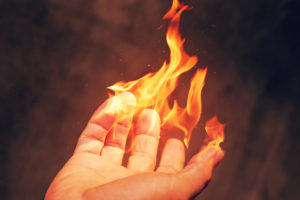 immensely, and all you wanted was relief. And that’s probably the extent of your recollection. However, if you were subjected to that same trauma at this very moment, the memory of the severity of that pain would return immediately – the throbbing and sadistic stinging that radiates from the burn down into your hand as it makes its way, traveling along your arm. The sensation of heat that continues to emanate from your hand long after the source of your burn has been removed. And do you remember how good it felt to run cold water over the burn or even put ice on it? The pain didn’t stop, although its severity was significantly diminished.
immensely, and all you wanted was relief. And that’s probably the extent of your recollection. However, if you were subjected to that same trauma at this very moment, the memory of the severity of that pain would return immediately – the throbbing and sadistic stinging that radiates from the burn down into your hand as it makes its way, traveling along your arm. The sensation of heat that continues to emanate from your hand long after the source of your burn has been removed. And do you remember how good it felt to run cold water over the burn or even put ice on it? The pain didn’t stop, although its severity was significantly diminished.
 But the moment you removed that calming cool, the pain returned immediately, and seemingly with a vengeance, didn’t it? But we can’t keep water or ice on this fresh wound indefinitely. At some point, we’re going to have to let this pain run its course and subside on its own. In a way, loving a narcissist is a very similar experience. After we leave, or are left via the final discard phase, the initial torture of being without our narcissist is ineffable.
But the moment you removed that calming cool, the pain returned immediately, and seemingly with a vengeance, didn’t it? But we can’t keep water or ice on this fresh wound indefinitely. At some point, we’re going to have to let this pain run its course and subside on its own. In a way, loving a narcissist is a very similar experience. After we leave, or are left via the final discard phase, the initial torture of being without our narcissist is ineffable.
For us, control had become the norm. Abuse equaled love. Our narcissist had become the center of our universe, a universe that has suddenly imploded and no longer exists. We are lost, aimless, nothing makes sense – their 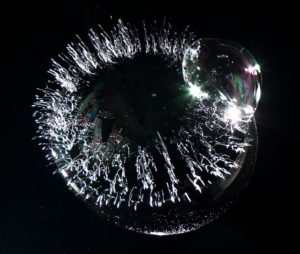 actions, their words, the echoing silence enveloped in the empty days and lonely nights that comprise one of the core components of the final discard phase – the silent treatment. This is one of the narcissist’s favorite forms of punishment because it requires zero effort from them and it shows you just how lost you are without them. We have never hurt like this before. If only this pain would stop! But as with our burn, what hurt us can’t be what heals us. That’s just not how healing works. It would be analogous to placing our injured hand back on the hot stove and expecting the pain to be leeched away.
actions, their words, the echoing silence enveloped in the empty days and lonely nights that comprise one of the core components of the final discard phase – the silent treatment. This is one of the narcissist’s favorite forms of punishment because it requires zero effort from them and it shows you just how lost you are without them. We have never hurt like this before. If only this pain would stop! But as with our burn, what hurt us can’t be what heals us. That’s just not how healing works. It would be analogous to placing our injured hand back on the hot stove and expecting the pain to be leeched away.
As time carries on, the insufferable pain of missing our narcissist begins to wane. Some days are better than others. We might have a few days where we find ourselves smiling, even laughing, but then something happens – a song we hear, a scent, perhaps we pass a place where we once shared a special memory with our narcissist – and we find ourselves back where we were days or even months earlier on our journey of healing; hurting and in anguish. Don’t fret. You are healing. What we have to remember is that this is perfectly normal. Healing is never a linear path from brokenness to wholeness but rather a cyclic journey. And, as such, those relapse days will become fewer and fewer. We find the smiles come more easily, the laughter 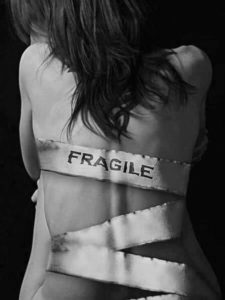 more naturally; healing has begun working its long-awaited magic. And with that healing, we tend to forget the depth and degree of a once-seemingly ubiquitous pain and its associated trauma, until we (perish the thought!) either become involved with a/our narcissist again or we find a suffering kindred spirit who reminds us what it was like going through that fresh hell of detoxing and healing. We forget how deeply we love(d) our narcissist. We forget the depth of how horribly we miss(ed) our narcissist. But we are reminded in another person’s pain.
more naturally; healing has begun working its long-awaited magic. And with that healing, we tend to forget the depth and degree of a once-seemingly ubiquitous pain and its associated trauma, until we (perish the thought!) either become involved with a/our narcissist again or we find a suffering kindred spirit who reminds us what it was like going through that fresh hell of detoxing and healing. We forget how deeply we love(d) our narcissist. We forget the depth of how horribly we miss(ed) our narcissist. But we are reminded in another person’s pain.
For anonymity’s sake, we’ll call her, “Christine.” Christine reached out to me in the throes of yet another discard phase with her narcissist, “Scott.” However, unlike previous discard phases, this one had continued far longer than any of the others over the past two years they’d been together. Even though Christine and I have only spoken via text, it was painfully clear she was in genuine agony. Scott had stormed out of her life and left her mind and heart reeling with that age-old question every empath tearfully asks when their narcissist punishes them with the silent treatment, “How long will I be without him/her, this time?” In Christine’s case, Scott has been gone for about a month, which is in stark contrast to the few days or maybe one week each discard phase had previously lasted.
As Christine and I conversed, I was taken with how unabashedly intelligent she is. At 30 years old, and sporting a degree in psychology, with aspirations of returning to get her doctorate, she was, by no means, “not smart.” And that’s a common  mistake many people who look in from the outside will make. “You must not be too smart if you allow someone else to control you like that.” We need to be clear here – finding oneself under the control of another person has nothing to do with intellect or a lack thereof. In fact, narcissists will generally gravitate toward someone of equal or superior intelligence because people who are not intellectually “on their level,” drain them. And since the narcissist’s modus operandi is to drain you, they’d never settle for being the one who’s drained or depleted.
mistake many people who look in from the outside will make. “You must not be too smart if you allow someone else to control you like that.” We need to be clear here – finding oneself under the control of another person has nothing to do with intellect or a lack thereof. In fact, narcissists will generally gravitate toward someone of equal or superior intelligence because people who are not intellectually “on their level,” drain them. And since the narcissist’s modus operandi is to drain you, they’d never settle for being the one who’s drained or depleted.
Additionally, I couldn’t help but notice that Christine is a stunningly beautiful woman. Truth be told, if Christine weren’t going through this fresh hell, she could quite literally walk into any room and have her choice of fervent suitor without a moment’s hesitation. But, Christine isn’t there. She’s not thinking about moving on with her life and finding a good  man who will admire, cherish, and respect her. She’s still mired in that dark and damning place filled with strife and turmoil where we, as empaths, find ourselves entrenched when our narcissist vacates our life. This is the toxic dynamic that is loving a narcissist. Sadly, Christine is still so deeply committed to Scott through those two years of trauma bonding, manipulation, and gaslighting, she doesn’t see the immense power she has in and over her own life. She’s still waiting for the return of someone who has absolutely zero appreciation of her and all of her amazing attributes. She’s been trauma bonded to Scott.
man who will admire, cherish, and respect her. She’s still mired in that dark and damning place filled with strife and turmoil where we, as empaths, find ourselves entrenched when our narcissist vacates our life. This is the toxic dynamic that is loving a narcissist. Sadly, Christine is still so deeply committed to Scott through those two years of trauma bonding, manipulation, and gaslighting, she doesn’t see the immense power she has in and over her own life. She’s still waiting for the return of someone who has absolutely zero appreciation of her and all of her amazing attributes. She’s been trauma bonded to Scott.
So what exactly is trauma bonding? Well, in a nutshell, trauma bonding is when a person is emotionally attached to their abuser through a series of events that, in some regards, resemble a sine wave. As you can see in the below image, in a sine wave, we have peaks and valleys that rise and fall relative to a central neutral point. What you’ll notice is that at no time does an attained high, or ensuing 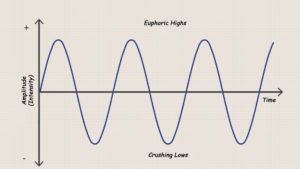 low, ever “stop” at that mid-point. In other words, there is no extended period of happiness or joy with a narcissist. It’s either a momentary, euphoric high, or a crushingly depressing low – there’s never any consistently middle ground where things are simply “good,” which means that things are generally “bad.” Believe it or not, that constant up-and-down cycle, or as I came to call it with my narcissist, “Riding the Russian Rollercoaster,” is a cycle of abuse that bonds an empath to their narcissist on a level that rivals the intensity and dependency of drug addiction.
low, ever “stop” at that mid-point. In other words, there is no extended period of happiness or joy with a narcissist. It’s either a momentary, euphoric high, or a crushingly depressing low – there’s never any consistently middle ground where things are simply “good,” which means that things are generally “bad.” Believe it or not, that constant up-and-down cycle, or as I came to call it with my narcissist, “Riding the Russian Rollercoaster,” is a cycle of abuse that bonds an empath to their narcissist on a level that rivals the intensity and dependency of drug addiction.
In many ways, detoxing from a narcissist runs a number of uncomfortable parallels to detoxing from alcohol or chemical dependency. You have bouts  of great joy and elation, realizing you’re finally free of your narcissist’s control. While, at the same time, you feel great lows over the realization that someone who had basically assumed control over your life, someone who had not only become integral to your world but had, for all intents and purposes become your world, is now no longer a part of that world or your life. So, how do you know if you’ve been trauma bonded to someone? Ask yourself these questions:
of great joy and elation, realizing you’re finally free of your narcissist’s control. While, at the same time, you feel great lows over the realization that someone who had basically assumed control over your life, someone who had not only become integral to your world but had, for all intents and purposes become your world, is now no longer a part of that world or your life. So, how do you know if you’ve been trauma bonded to someone? Ask yourself these questions:
- Do you feel trapped and powerless in the relationship but try to make the best of it?
- Are there moments where, deep down, you don’t know if you like/trust the other person, but you feel as though you can’t leave?
- Is the relationship intense and complex, involving repeatedly broken promises of change?
“I promise things will get better.”
“I promise I’ll marry you one day.”
“I promise I’ll stop drinking/doing drugs.”
“I promise when I get a job, things will be different.” - Even though the other person constantly lets you down, do you still believe their promises?
- Is your partner ‘sometimes’ abusive, but you try to focus on the ‘good’ in them?
- Do you believe that you can somehow change them so they aren’t emotionally/physically abusive?
- Have your friends/family urged you to leave the relationship but you stay?
- Do you find yourself defending the relationship if others criticize it?
- Have you have tried to leave, but you feel physically ill if you do, as though you will die or your life will be destroyed?
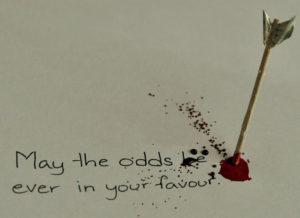 If you answered, “Yes,” to most or all of these questions, the odds are not so much in your favor. You are in an abusive relationship with someone who has used trauma bonding to gain control of you. And what we have to jointly realize, our physical mind is wired to reward us with a little something called dopamine when we experience pleasure such as when someone praises us or we experience a sense of accomplishment. And when that praise comes immediately on the heels of trauma, especially with repeated cycles of trauma and praise, our mind becomes conditioned to equate trauma with feeling good. Or, to put it another way, abuse = love. So, when our narcissist/abuser hurts us, but then turns around and buys us something nice/expensive, does a perceived act of kindness, bestows their praise on us, or simply “rewards us” with make-up sex, we get a sudden surge of feeling happy – and there’s the dopamine.
If you answered, “Yes,” to most or all of these questions, the odds are not so much in your favor. You are in an abusive relationship with someone who has used trauma bonding to gain control of you. And what we have to jointly realize, our physical mind is wired to reward us with a little something called dopamine when we experience pleasure such as when someone praises us or we experience a sense of accomplishment. And when that praise comes immediately on the heels of trauma, especially with repeated cycles of trauma and praise, our mind becomes conditioned to equate trauma with feeling good. Or, to put it another way, abuse = love. So, when our narcissist/abuser hurts us, but then turns around and buys us something nice/expensive, does a perceived act of kindness, bestows their praise on us, or simply “rewards us” with make-up sex, we get a sudden surge of feeling happy – and there’s the dopamine. 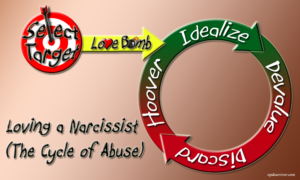 Repeated cycles of this result in us becoming trauma bonded to our abuser. Consequently, if we try to leave? Panic, fear, even crippling anxiety is most often the result. And we, inevitably, find ourselves back with our narcissist, resuming that same destructive dynamic.
Repeated cycles of this result in us becoming trauma bonded to our abuser. Consequently, if we try to leave? Panic, fear, even crippling anxiety is most often the result. And we, inevitably, find ourselves back with our narcissist, resuming that same destructive dynamic.
 In the end, the only “cure” for someone who has experienced trauma bonding is very similar to the approach for someone with chemical dependency – abstinence. By removing their abusive presence from our lives, we slowly begin to recover and realize that we not only can have a happy and full life without our abuser but, in almost every documented case, it’s a far happier and more satisfying life because we are no longer subjected to the repetitive and demoralizing abuse of our abuser. The only problem with this is because it is so easy for us to fall back into our narcissist’s sadistic grip, much like an alcoholic or addict can relapse (fall off the wagon), it helps for us to have a sponsor, someone who has been where we are and thoroughly understands the hell we are going through. Someone who is familiar with the perils and pitfalls, who can be that lifeline you can call at 2:00 in the afternoon or 2:00 in the morning when you feel you’re about to drown in a sea of claustrophobic hopelessness and despair.
In the end, the only “cure” for someone who has experienced trauma bonding is very similar to the approach for someone with chemical dependency – abstinence. By removing their abusive presence from our lives, we slowly begin to recover and realize that we not only can have a happy and full life without our abuser but, in almost every documented case, it’s a far happier and more satisfying life because we are no longer subjected to the repetitive and demoralizing abuse of our abuser. The only problem with this is because it is so easy for us to fall back into our narcissist’s sadistic grip, much like an alcoholic or addict can relapse (fall off the wagon), it helps for us to have a sponsor, someone who has been where we are and thoroughly understands the hell we are going through. Someone who is familiar with the perils and pitfalls, who can be that lifeline you can call at 2:00 in the afternoon or 2:00 in the morning when you feel you’re about to drown in a sea of claustrophobic hopelessness and despair.
So, will Scott return? Probably. Most assuredly if his current (replacement) source of narcissist supply falls short of his lofty expectations and definitely if she fails to fall prey to his attempts at gaslighting and manipulation. But, more importantly, will Christine take him back? Possibly. I’ll admit I probably would have taken my narcissist, Julia, back if she had returned a month after I walked away. Most definitely if she had seemed genuinely penitent. Narcissists are exceptional at seeming contrite, especially if it means regaining a previous source whom they have adequately trained to appease them and their wants/needs – it’s so much less work for them in lieu of having to train someone new. I only hope that, by the time Scott does return, Christine has sufficiently healed to the point where, no matter how difficult it might be, she tells Scott, “No!” and closes the door on him as she finishes writing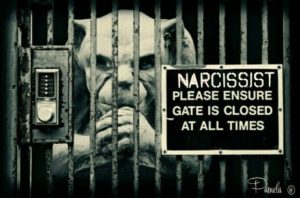 this painful chapter of her life. Beautiful, no matter how inescapable your current situation might feel, never forget – loving a narcissist is a life lesson, not a life sentence.
this painful chapter of her life. Beautiful, no matter how inescapable your current situation might feel, never forget – loving a narcissist is a life lesson, not a life sentence.


Leave a Reply